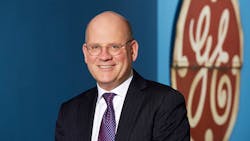GE’s New CEO Signals Sweeping Makeover for Dow’s Biggest Laggard
General Electric Co.’s new boss has barely uttered a word in public during his first two months on the job. But CEO John Flannery is already signaling his intention to forge one of the most sweeping makeovers in the company’s 125-year history.
He accepted a board appointment Monday for Ed Garden, a founding partner of activist shareholder Trian Fund Management, which has been pressuring GE for an overhaul. That came after the company named a new chief financial officer and announced the exit of two other high-profile executives Oct. 6. Flannery is also seeking deep cost cuts and weighing major portfolio changes as he seeks to reverse this year’s biggest drop on the Dow Jones Industrial Average.
Flannery, who last week also took on the chairman title, may be poised to slash earnings expectations when he presents plans to revitalize the beleaguered manufacturer at a meeting scheduled for Nov. 13. Even a dividend cut is a possibility, according to Vertical Research Partners, as GE contends with weak cash flows and sluggish demand in the power-generation and oil markets.
“If earnings and cash flow are going even lower than we thought, the dividend clearly should be cut,” analyst Jeff Sprague of Vertical Research said in an Oct. 6 note. “GE could end up in a better place once the dust settles but investors should steer clear until we learn more. That better place could be with a starting point much lower for the stock price.”
Garden, who works closely with Trian’s Nelson Peltz, will replace Robert Lane on the board, GE said in a statement Monday. The Boston-based maker of jet engines, gas turbines and ultrasound machines maintains “active and constructive dialogue” with Trian, according to the statement.
“Like other GE shareholders, I am disappointed by the recent performance of GE’s stock,” Flannery said in the statement. “But I continue to believe that GE represents an attractive long-term investment opportunity with significant upside.”
Cost Cuts
The shares fell 1% to $24.15 ahead of the start of regular trading in New York. GE has tumbled 23% this year, putting it on track for the worst performance for a calendar year since 2008.
Flannery has been meeting with investors and has said he will consider all options to turn the company around. He has cut services such as corporate jets and company cars as part of an existing plan to eliminate $2 billion of costs through 2018. Analysts believe he may reduce expenses by an even greater amount.
The face of GE changed dramatically last week as several of the company’s most well-known executives, including Chief Financial Officer Jeff Bornstein, stepped down. Vice Chairs Beth Comstock, GE’s top female executive and a leading figure in its embrace of Silicon Valley, and John Rice, the primary international officer, also said they would retire. The departures, announced late on Oct. 6, came shortly after Jeffrey Immelt stepped down as chairman earlier than planned.
Jamie Miller, who heads GE Transportation, was appointed CFO.
Bornstein’s resignation comes after he was passed over to succeed Immelt. When Flannery’s appointment was announced, Bornstein, 51, was promoted to vice chair and the company said he would work closely with the new boss.
The departing CFO was regarded among investors and analysts as a knowledgeable and plain-spoken partner to Immelt’s big-vision CEO. Bornstein, who joined GE in 1989 and held a number of finance-oriented roles, was considered a major driver of GE’s plan to shed about $200 billion of lending businesses and refocus on industrial manufacturing.
Faded Star
But Bornstein’s star faded in recent months as he shouldered some of the blame for GE’s cash-flow issues. The executive changes “serve to build expectations that game-changing strategic moves will be unveiled” at the Nov. 13 meeting, Deane Dray, an analyst with RBC Capital Markets, said in a note to clients.
Analysts expect profit this year of $1.54 a share, according to the average of estimates compiled by Bloomberg, less than GE’s forecast of at least $1.60. While GE has discussed earnings of $2 a share in 2018, analysts are predicting $1.67 on average.
A dividend cut may be necessary since the existing payout “consumes all or most’’ of GE’s industrial free cash flow for the foreseeable future, Sprague said. GE has said maintaining the payout is a top priority and has declined to comment on the possibility of a dividend cut.
The company cut its dividend in 2009 during the financial crisis, the first such move for GE since the Great Depression. The company pays an annual dividend of 96 cents, for a yield of 3.9%.
By Richard Clough, with assistance from David Carey
About the Author
Bloomberg
Licensed content from Bloomberg, copyright 2016.
